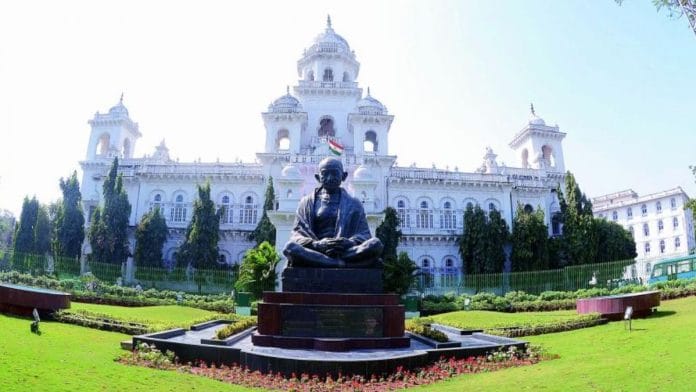In Hyderabad, while the state language Telugu has its own relevance, Urdu also has space and agency—a good chunk of the 12 per cent of the city’s Muslim population consumes news in the language.
The Urdu media is prominent in Hyderabad, unlike other cities. Politicians and the government need to speak with Urdu journalists to get their message across, albeit the quality of news is, of course, up for debate.
Which is why I was surprised to learn that some of the Urdu press or media persons were not allowed to attend the 31 August session of the Telangana Assembly. The Justice PC Ghose Commission report on the Kaleswaram lift irrigation programme was presented, which looked into irregularities by the previous Bharat Rashtra Samithi (BRS) government.
According to a statement by the Hitech Print & Electronic Media Association president, Md Shafiuddin, cable TV operators accredited with the Telangana government were denied passes to the state Assembly. He wrote a letter to Chief Minister Revanth Reddy, informing him about the incident.
Some activists, including Congress member Dr Lubna Sarwath, have also written to the Telangana Assembly over the issue. She also pointed out that the Media Academy of Telangana, run by the state government, itself conducted training classes for Urdu journalists on 30 August and 31.
Also read: Severe Hyderabad internet outages make it an IT hub without the IT part
Press freedom in Telangana
This was not the first time that something like this happened. Urdu reporters usually receive the short end of the stick at press conferences. The Congress government preaches freedom of speech, but this is the second time in the last two years that it has had an issue with the media.
Before this, journalist Revathi Pogadadanda and her colleague Thanvi Yadav were arrested in March this year, booked under several offences.
The Hyderabad police registered a case against them under section 67 of the IT Act (publishing or transmitting obscene material in electronic form), Section 61(2) (criminal conspiracy), Section 353(2) (spreading false information to incite enmity or hatred), and Section 352 (insulting someone with the intent to provoke breach of peace) of the Bharatiya Nyaya Sanhita (BNS).
It was after a Congress social media state secretary accused the duo of sharing a clip of a farmer who is seen abusing CM Reddy. The farmer is seen criticising the state government for the lack of welfare.
The Congress government has shown that it is no better than the BRS, which it had called anti-democratic.
I have seen all small and big regional TV channels getting access to all places, so selectively restricting Urdu media personnel is rather unfair.
Those who attend Assembly sessions said that the government’s step was likely because YouTubers try to gain access to such events, masquerading as journalists. However, if some of them have managed to obtain accreditation, then there is something wrong with the government’s accreditation process itself.
Either way, Telangana as a state has a history of being more robust in protecting our fundamental rights. And restricting the media, especially those that can reach out to a minority community, is not right. I hope better sense prevails, and in a state where Urdu is the second official language, its press freedom is not curbed.
Yunus Lasania is a Hyderabad-based journalist whose work primarily focuses on politics, history, and culture. He tweets @YunusLasania. Views are personal.






